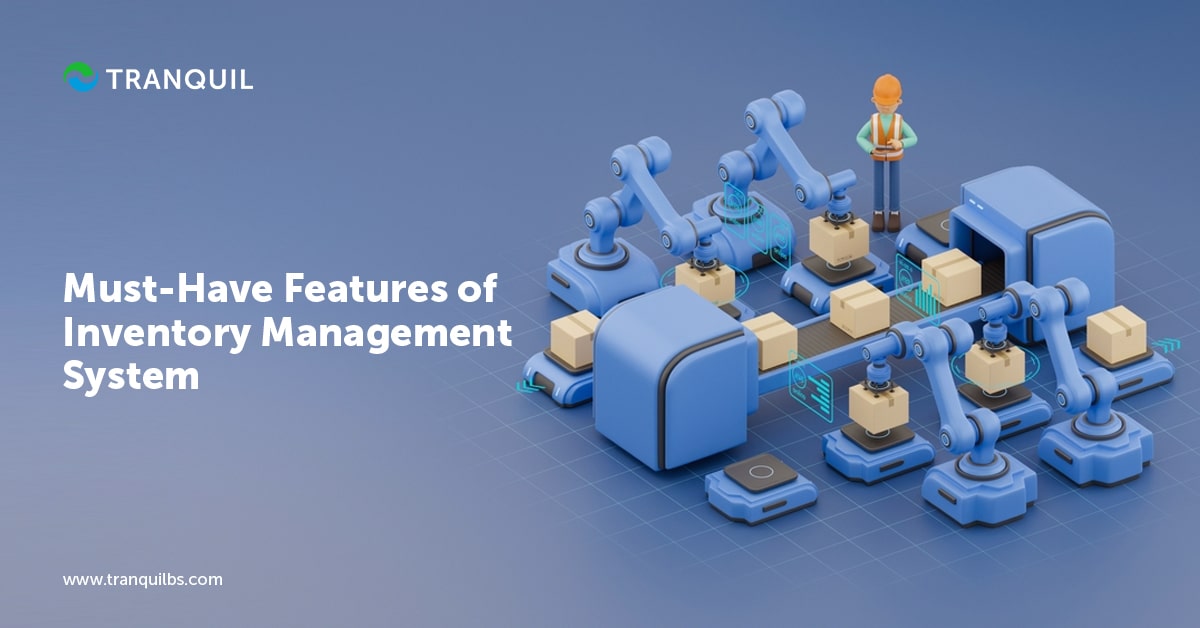to be meticulously tracked and managed; only then can you reduce costs and boost profitability.
This is exactly the function of inventory management – it must be able to support product/material procurement too; previously, these systems were mostly manual, and focused on record maintenance and simple reports.
However, today businesses are look at strategic needs, and planning more thoroughly – analyzing sales trend to predict future demand as accurately as possible in order to be able to fulfil demands of discerning customers.
Inventory management is an important part of supply chain management.
The market is flooded with solutions; in such a scenario, which solution should you choose for your business, and what are the desired inventory management system features?
What Is an Inventory Management System?
Whether you are a distributor, manufacturer, retailer or wholesaler, your purchase department is tasked with product procurement, reordering products to replenish dwindling stocks, etc.
An inventory management system can help you to track all incoming and outgoing inventory to meet customer demand better, and avoid both stockouts which leads to loss of business, and overstocking which leads to huge carrying costs.
The system has an impact on all important business functions like production, purchase, accounts, warehouse management, sales, marketing, and customer service.
ALSO READ: What is an Inventory Control System?
What Are the Major Specifications of Inventory Management Systems?
The major specifications of the inventory management system include providing a way to store, organize, track, and study inventory data, and the requirements include:
- A user-friendly interface that can be used by tech newbies
- Automation of manual processes and streamlining of business functions
- Robust and secure database that offers real-time data that is accurate.
- Facilitates quick and actionable inventory tracking and control
- Easy scalability
- Software integration and automation that minimize manual inputs
Inventory System is a Strategic Choice
If you look up inventory management systems, you can find hundreds of them online.
So how will you know what’s best for your business?
Today you get systems specialized for specific businesses; if you’re a wholesaler, eliminate those specifically made for manufacturers; similarly, eliminate those systems created for specific industries which are not yours.
As a retailer, you need a more customer-centric application.
As a manufacturer, you should check out systems made for manufacturers.
It is essential that you have a clear understanding of your business requirements before you search.
ALSO READ: Inventory Management Trends to Know
Inventory Management Software Features
1. Real-time Tracking of Inventory
It is absolutely essential to be able to know what inventory you have and where it is in real time.
It must reflect stock coming in or going out, and allocations as well.
- Sales orders should be reflected in the stock to prevent selling stock that can’t be delivered
- Inbound inventory must be reflected as soon as they are scanned on entering the warehouse
- Transfers of inventory must be recorded in real time
- Consignment stock must be tracked even if it’s held elsewhere
2. Inventory Value in Real Time
The finance team must know the exact worth of the inventory the company holds.
Ergo, a robust inventory system must offer:
- Precise values that also consider price and volume variations in your purchase
- A real-time view of inventory value categorized by country, region, warehouse, etc
- If you trade internationally, multi-currency support
- Tracking variable costs like production wastage, courier charges etc.
- A granular view of the cost of goods sold through proper grouping
- Real-time view of profit margins on products by location and sales channel accounting for variable costs
ALSO READ: Common Inventory Management Problems and Solutions
3. Reorder Levels and Low Stock Alerts
One of the major reasons you must manage inventory efficiently is to ensure that you always have sufficient stock for sale or production.
The software should allow you to set automated alerts when stocks reach a specific level – taking into account supplier lead times, so that fresh stocks come in just before you completely run out.
4. Purchase Management and Supplier Management
With a robust inventory management system, you can exercise greater control over your purchases, knowing exactly what you have on hand, its value and location; this allows you to make better choices when you have to place orders for fresh stock.
It is far more efficient than manual systems.
Reliable systems like Tranquil allow you to:
- Generate P.O’s and automatically fill them
- Store all vendor details centrally
- Generate supplier discounts dynamically to ease optimal purchasing
- Check supplier-wise transaction history
5. Unlimited SKUs
A good inventory management software should not limit the number of products you are able to add – or customers, vendors, and transactions, for that matter.
When you invest in software, it’s because you are focusing on growth.
Therefore, your software should be scalable and future-ready.
ALSO READ: Benefits of Warehouse Management System
6. Robust Reporting
Your software must be able to churn out a variety of reports based on different criteria; only then can it be termed reliable and efficient.
Manual data extraction every month is tedious and prone to errors.
You should be able to generate reports on unit sales, age of inventory, inventory turnover rate, margins, rate of backorders, average number of days each SKU takes to sell, and so on.
The Best IMS Features For Manufacturers
Let’s now look at features you should have if you’re a manufacturer
1. Assemblies
Internal stock movements and value shifting to assembled products from individual parts.
2. Bills of Material (BoM) management
A BoM is basically the recipe for manufacturing a product: the exact quantities of raw materials, accessories, other components etc.
You can significantly simplify the process of ordering the correct components in the exact quantities for uninterrupted and economical production if your BoMs can be handled by the IMS.
A desirable but not critical feature is automatic filling of P.O’s straight from the BoM, considering what stock is available, to fulfil the production.
Nesting of BoMs for complex products, and recording the value of wastage in production are also good to have.
ALSO READ: Pipeline Inventory and Decoupling Inventory
3. Batch or Lot tracking
This is especially valuable for food manufacturers as it helps you track batches and monitor their expiry dates.
This can help you consume or sell such goods before they become unusable.
Batch tracking also helps in the event a product has to be recalled.
4. Serial Number Tracking
This goes a step further than batch tracking and tracks each individual component or product.
This is critical if your business manages several components that are high in value, or are very specific, or even if after-sales service is a critical aspect of your business.
The Best IMS Features For The Warehouse
If you operate your own warehouses, you should look for these features:
1. Electronic Scanning
Electronic tracking of goods in warehouses is far more efficient, which is why it is also very popular.
Nowadays, warehouses use various methods like barcodes, QR codes, RFID tags. GPS, Bluetooth etc. to keep track of inventory.
Software support for electronic scanning is therefore an essential feature nowadays.
The scanning is typically used for stock counting, receiving purchase orders, and sales shipments.
ALSO READ: What is Negative Inventory?
2. Picking, Packing and Dispatching
The core activities in a warehouse are picking, packing, and dispatching; it is therefore essential that you exercise excellent control and have flexibility in this regard.
Check if the application has features like partial shipment completion capability, international commerce code support for international shipments, and warehouse internal route optimization via flexible pick lists.
3. Stocktaking Support
Stocktaking is a critical inventory activity, and it is absolutely essential that your inventory management system has this feature included.
Though terribly cumbersome, you do have to manually verify stock figures; hence, it is a good idea to have software that will reduce the effort as much as possible.
Ideally, the IMS should include features that don’t cause a lot of disruption or downtime.
Stock adjustment is another feature it should have so that discrepancies can be rectified and variance reporting to follow up can be carried out properly.
ALSO READ: Route and Van Sales – Challenges and Opportunities
Additional Desirable Features
The features we talked about earlier were the absolutely essential ones.
Now we come to some desirable features that can simplify your life immensely.
1. A Mobile Sales App
Your employees working on the shop floor or on the road are greatly benefited with this as they can respond to customer queries about what’s in stock by checking in the app, instantly.
This visibility (into lead times as well as current stocks) will help them close deals quickly, fulfil orders, and boost sales.
2. Support for Multiple Sales Channels
Multiple sales channels are invaluable in handling disruptions, like the one caused by the COVID-19 pandemic. Ideally, your IMS must:
- Integrate with POS apps
- Integrate with B2C sales enabling eCommerce platforms
- Be able to take B2B orders efficiently
Your sales order management system must flow seamlessly from your various sales channels to your inventory and preferably through purchasing for best results.
It would also help if it is able to maintain visibility into accurate margins over all the channels.
ALSO READ: What is Mobile ERP? Benefits and Applications
3. Modern Data Security
Based on where you are located and the nature of your business, you may be required to implement specific levels of data security by law.
Regardless of that it also makes good business sense to have ironclad security that will protect customer and company data of a sensitive nature.
Tranquil ERP has superior encryption standards which means you don’t have to worry.
4. Compatibility with your Other Apps
If you use CRM or other apps, it is essential that your inventory management solution should be able to integrate smoothly with them.
This means easy sharing of data between applications, which simplifies life for you.
At the very least, your IMS should be capable of integrating with other apps via API, if not a plug and play solution.
ALSO READ: Advantages of ERP to Automotive Businesses
5. Advanced Analytics
When you have advanced inventory management software features, it goes without saying that the system will churn out mountains of data.
Including a built-in business intelligence feature will be a huge plus for you, as it will deliver actionable insights, which helps you take informed decisions to improve inventory efficiency.
Tranquil ERP has a proven track record when it comes to helping companies manage their inventory efficiently. You should not hesitate to implement this robust inventory management system in your business to save time and money and improve your profitability. Schedule a FREE demo to see exactly how this can be done.





